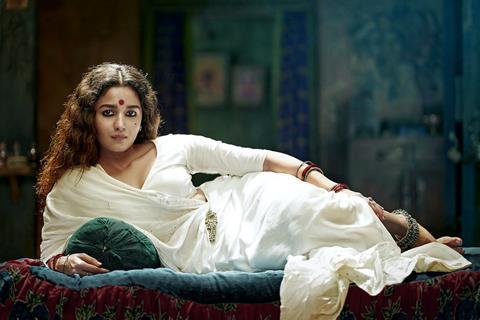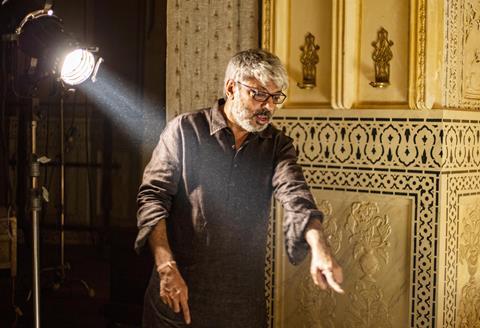
Acclaimed Indian filmmaker Sanjay Leela Bhansali conjured a fake falling out on set, toned down his signature lavish filmmaking style and revisited a childhood memory in the service of bringing Gangubai Kathiawadi to the screen.
Known for historical epics such as Padmaavat (2018), Bajirao Mastani (2015), Sony-backed Saawariya (2007) and Devdas (2002), which screened at Cannes, Bhansali has this time used a crime drama to tell the true story of how a young girl forced into prostitution battles personal and public pressures to became the madame of an infamous brothel in India.
Gangubai Kathiawadi portrays how she advocated for prostitute rights and helped the legions of impoverished women in her community.
The Hindi-language film is loosely based on the life of Ganga Jagjivandas Kathiawadi, popularly known as Gangubai, as documented in S. Hussain Zaidi’s book Mafia Queens of Mumbai.
“I started this film in my mind in 2012. I read the book and bought the rights,” says Bhansali. “But then I thought ‘my mind is not ready yet to make this film’.”
After shooting three other films – RamLeela, Bajirao Mastani and Laal Ishq – he realised he wanted to completely change the style and scale of the way he had previously approached filmmaking to do justice to the story of Gangubai Kathiawadi.
“I have always wanted embellishments and curtains and pillows and architecture and rich costumes but with heavy-duty dialogue,” Bhansali explains. “For Gangubai Kathiawadi, I was stripped of everything. It was new territory, an adventure zone for me and I was on guard from beginning to end.”
The filmmaker had long been drawn to Gungubai’s story; he had grown up in Mumbai too, close to Gungubai and her brothel. “For 30 years of my life, I lived in a lane next to Gungubai,” Bhansali explains. “I knew the ambience, the atmosphere, the people, the kind of faces and the different stories they had. I want people to experience that perspective of a schoolboy going through that lane, my memories of the watercolour impressionism of that lane.”
With Indian-British Bollywood superstar Alia Bhatt on board to star along with Ajay Devgn, Shantanu Maheshwari, Vijay Raaz, Indira Tiwari, Seema Pahwa and Varun Kapoor in pivotal roles, Bhansali began shooting in 2019 before being shut down for a lengthy period during the Covid-19 pandemic and starting again in late 2020.

Casting Indian-British actor Bhatt as Gungubai was an easy decision: Bhansali had met her when she was aged just nine for another project that didn’t work out and kept in touch. His memory of the actor’s piercing eyes that “spoke without words” remained with him and she was top of his wishlist.
Working with Bhatt was fun. “She’s very good at craft but doesn’t show that craft to the audience. It’s all heart,” says Bhansali. “Performers like her cut straight through to reach people.”
The film includes myriad set-pieces including the dances and songs of Indian films.
Production took place on a big floor studio in Mumbai’s Film City, where Bhansali and his team built Kamathipura, Mumbai’s downtown red-light district. “We recreated the lanes and houses because it was impossible to shoot with a star like Alia [Bhatt] at a real location,” Bhansali explains. “We had a 125 -day schedule so a big set was more convenient and practical.
“We didn’t do too many readings or rehearsals, because I don’t like rehearsals,” the director reveals. “I feel if I live that moment in the office too many times, with too much precision in reading, you lose the spontaneity on the set.”
One of the most challenging scenes was the one in which Bhatt’s character Gungubai talks to her mother on the telephone after many years. The operator keeps interrupting the tense and emotional exchange. Bhansali realised he needed to strip the scene – and the people around it – right back and provoke a particular reaction out of his star.
“[Bhatt] wasn’t getting in the zone,” Bhansali recalls. “I suddenly looked at her staff, her makeup man, her hairdresser and yelled at them. I pretended that they were laughing at me while I was instructing Alia. I wanted a reason to just shout out and make her (Batt) angry.”
It worked. Bhatt delivered the emotionally charged and pivotal scene in Gungubai’s story perfectly. With the scene in the can, Bhansali explained to his relieved star that he had in fact made up the spat to stir the anger-fueled energy the moment demanded.
Gangubai Kathiawadi debuted at the 2022 Berlinale, and has gone on to become the most-watched Indian title globally on Netflix following a successful theatrical release. Gangubai Kathiawadi is backed by the director’s Bhansali Productions along with Mumbai’s Pen India.
Bhansali describes the film as “my most intimate, personal work. There is an inherent violence, emotional violence to the scenes, a constant sense of insecurity,” he says. “Those little elements I had to constantly be alert to and change my style of filmmaking. It is different from the other films I’ve made.”
“There are so many unsung heroes in life. Gangubai’s story needs to be told.”






![The Brightest SunScreen[Courtesy HKIFF]](https://d1nslcd7m2225b.cloudfront.net/Pictures/274x183/3/5/0/1448350_thebrightestsunscreencourtesyhkiff_312678.jpg)














![The Brightest SunScreen[Courtesy HKIFF]](https://d1nslcd7m2225b.cloudfront.net/Pictures/100x67/3/5/0/1448350_thebrightestsunscreencourtesyhkiff_312678.jpg)



No comments yet